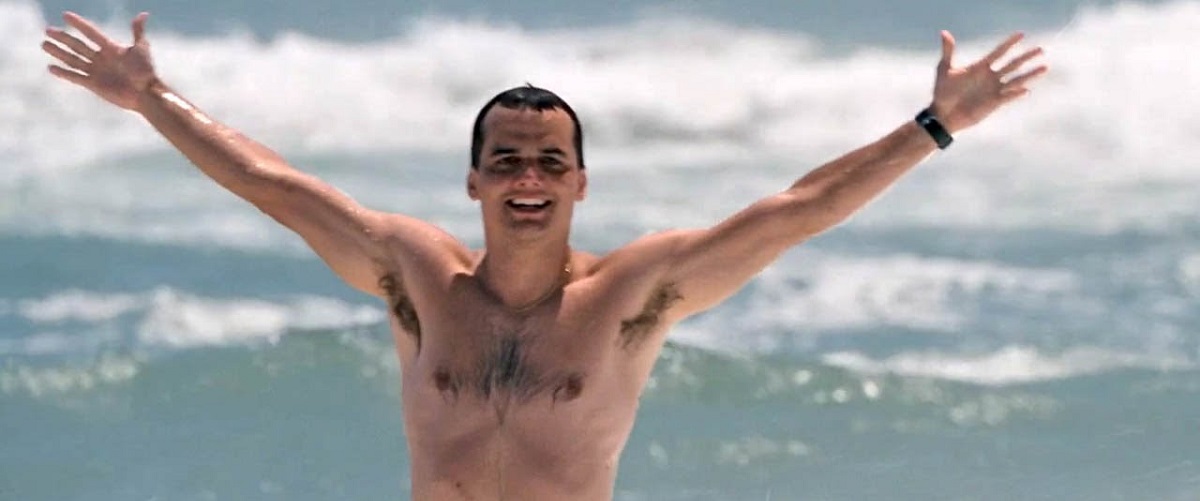By Chlotrudis Independent Film Society
Rating: 5 cats
Director: Karim Aïnouz

Original language title: Praia do Futuro
Country: brazil, germany
Year: 2015
Running time: 106
IMDB: http://www.imdb.com/title/tt2488778/combined
Kyle says: “FUTURO BEACH is in danger of being swallowed into the niche sinkhole of gay cinema, and being dismissed for a strict, even boring tri-partite formal structure, bookended by men on motorcycles. That would be a lamentable fate for this work, which is very close to a masterpiece, and potential enthusiasts are strongly advised to seek it out for themselves. These formal chapter names echo romantic novels of two centuries ago, respectively ‘The Drowner’s Embrace’, ‘A Hero Cut in Half’ and ‘A German-Speaking Ghost’. The bookending motorcycle rides take place across sand dunes of the Praia do Futuro in Brazil, and along fog-enshrouded Autobahn near a desolate beach in northern Germany.
“After biking on the dunes of Praia do Futuro, two young ex-military men from Afghanistan throw off their clothes and jump into the pounding surf. Heiko (Fred Lima) drowns but Konrad (Clemens Schick) is saved by local lifeguard Donato (Wagner Moura). As they struggle in the raging surf, the question is immediately posed about the identity of the ‘Drowner’, since Futuro is a very dangerous beach. Donato is visited by his idolizing younger brother Ayrton, who laughs in disbelief at his question about drowning, since his brother is Aquaman, a hero with superpowers. Donato is feeling vulnerable, not only because Heiko is the first swimmer he has been unable to save, but also because the body has not been found.
“Donato informs Konrad of the death of his friend with compassion and gentleness, offers to drive him back to his hotel, and the two are next seen in the throes of passionate sex in the back of his car. A bond is formed between them, and almost imperceptibly a relationship evolves. Director Karim Aïnouz, whose fifth feature this is, is more concerned with moments, and feelings caught on the fly, often when one character is not aware of scrutiny by the other.
“Frequently the exquisitely photographed landscapes, both natural and artificial, reflect the emotional stillness (or confusion) of the characters, reminding this fan how Michelangelo Antonioni used to do precisely the same thing. What is so arresting, and then moving, and finally astonishing, is how generously Aïnouz allows each scene to breathe fully, and every emotion of Donato and Konrad to be shared totally with the audience, even as moments in their relationship seem so surprising. Sitting together on Futuro Beach, Donato explains that the salt is so aggressive it corrodes concrete and iron; Konrad responds, ‘You’ve been trained to find everything normal. You’ve got used to people dying’. A particularly vivid scene of the military fire brigade men doing calisthenics, physically grappling to counter ‘The Drowner’s Embrace’ will remind viewers of sunlight caressing bodies exercising in Claire Denis’s BEAU TRAVAIL (1999).
“Konrad invites Donato to return to Berlin with him, and the second chapter ‘A Hero Cut in Half’ is about Donato trying to live fully and have a relationship with Konrad, while experiencing emotional trouble over deserting his brother and mother, and living in a climate where there is no beach. At least Konrad and Donato smile, laugh, drink beer and sing badly and dance clumsily together. During one scene of the two at play, the wall between audience and actors seems to disappear entirely, with the resulting sexual intimacy shockingly intrusive. I can think of no recent film in which the details of German apartment buildings, streets and shops are captured more specifically lyrically than this one (except perhaps A COFFEE IN BERLIN. Even though Donato seems to have found his own life with Konrad, it is clear he must return to Futuro Beach. In a hilarious moment of homesickness in a Berlin bar, Donato is reminded by the savvy bartender: ‘Hey, Brazilian, don’t be so sad — Everything will be fine when the future arrives’.
“But the conflicted Donato, whom Konrad has called a coward because he won’t stay in Berlin, doesn’t get off the train at the airport, and in the third section ‘A German-Speaking Ghost’, his angry teenage brother tracks him down to vent his feelings of rage and betrayal. And steals Konrad’s motorbike to go riding in a gesture of total defiance. In the final sequence, Konrad, Donato and his brother Ayrton go riding two motorbikes on the foggy Autobahn, heading to a frigid beach somewhere in the north of Germany. Not a word is spoken, nor is there need for one, as the rhythms of the miraculous cinematography by Ali Olay Gözkaya record all the valedictory emotional information required.
“Going back over my notes, I found repeated comments about superlative sound by Danilo Carvalho, and miraculous music by Hauschka, otherwise known as Volker Bertelmann, and wondered if FUTURO BEACH had received any acknowledgement from critics groups in addition to LGBT organizations. I was delighted to discover on the IMDB multiple nominations for director Karim Aïnouz, and awards for Best Music to Volker Bertelmann, Best Sound to Danilo Carvalho and Matthias Schwab, and Best Cinematography to Ali Olay Gözkaya. The performances by lead actors Wagner Moura and Clemens Schick are at a level of artistry that beggars searching for the right words. FUTURO BEACH is one of the best films of 2015. 5 cats
“Seen Friday, August 14, 2015, on Netflix, New York.”
